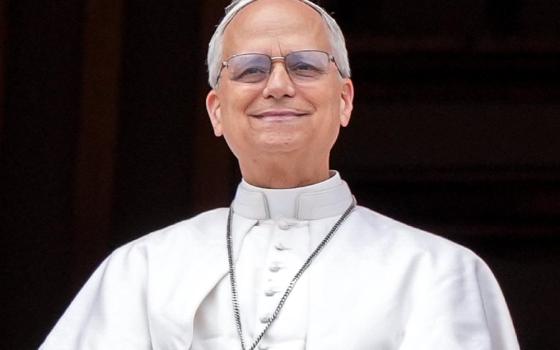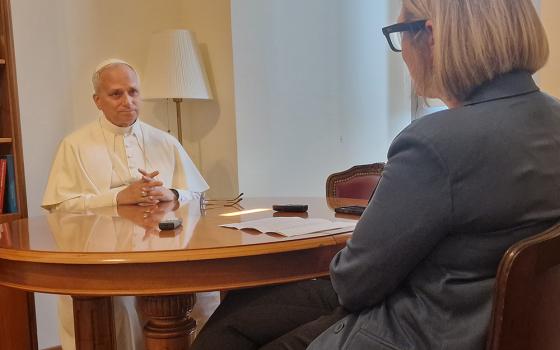Mourners carry bodies of Palestinians in Gaza City, July 30, who were killed by Israeli fire while trying to receive aid. (OSV News/Reuters/Mahmoud Issa)
The headlines, increasingly grim by the day, have been relentless. The brutality of Israel's ongoing assault of Gaza is breathtaking. The leveling of towns and killing of civilians, the starvation of women and children defies words.
- " 'Worst case scenario of famine' unfolding in Gaza, UN-backed body says," The New York Times, July 30, 2025
- "More than 60,000 people killed in Gaza war, local health officials," The Washington Post, July 29, 2025
- "Famine is unfolding in Gaza, U.N.- backed group says," The Wall Street Journal, July 29, 2025
Israel's actions in Gaza have led to a remarkable headline — and a word — that previously might have been unthinkable:
"In a first, leading Israeli rights groups accuse Israel of Gaza genocide," The New York Times, July 28, 2025
The accounts of women and children having to choose between starvation or risking death by the Israeli military on long treks to food stations carry echoes of the horror that shaped modern Jewish life.
Israel is engaged in "coordinated action to intentionally destroy Palestinian society in the Gaza Strip," said the groups, B'Tselem and Physicians for Human Rights — Israel, in their report, "Our Genocide." Such intent means "Israel is committing genocide against Palestinians in the Gaza Strip," according to the report.
Elevating criticism of the campaign in Gaza to that level by Israelis is a stunning development. The word genocide was coined to describe Germany's attempt to exterminate Jews and has a specific meaning in international law. That fellow Jews are now using the word genocide is a powerful indication that Israel has at the least crossed a moral line.
Those two human rights groups aren't lone voices.
Former Prime Minister Ehud Olmert, in a guest column in the Israeli newspaper Haaretz and on CNN, said Israelis are committing war crimes in Gaza. "What we are doing in Gaza now is a war of devastation: indiscriminate, limitless, cruel and criminal killing of civilians," he wrote. "It's the result of government policy — knowingly, evilly, maliciously, irresponsibly dictated. Yes, Israel is committing war crimes."
In an interview with NPR, Omare Bartov, a Holocaust scholar who grew up in Israel and served in its military, said he initially was reluctant to use the word genocide. Eventually, he said, he decided that what he was witnessing was a deliberate attempt "to systematically destroy Gaza. … and to make it impossible, if ever this is over, for that group to reconstitute its identity as a group by completely erasing everything that is there."
A United Nations report in March concluded that Israel has committed genocide. On July 3, Amnesty International said "Israel has continued to use starvation of civilians as a weapon of war" as "part of its ongoing genocide."
To be sure, there are those who say Israel's campaign does not amount to genocide. John Spencer, a U.S. Army veteran who studies urban warfare at West Point, said on NPR he interviewed Israeli civil and military officials and embedded with the Israeli Defense Force in Gaza, but had not spoken to Palestinians.
Palestinians walk past the rubble of destroyed buildings in Gaza City, Feb. 6 during the Israeli offensive, amid a Jan. 19 to March 18 ceasefire between Israel and Hamas in the Gaza Strip. (OSV News/Reuters/Dawoud Abu Alkas)
"The prime minister, defense minister, the chief of staff [are] saying our fight is not with the people of Gaza. It is with Hamas," Spencer said. "And all the mountain of evidence of what Israel is doing to preserve infrastructure, civilian life, to provide services … I mean, the number of field hospitals, the number of water pipes, the amount of aid. All of these things are contradictions" of the genocide claim, he said.
The evidence in Spencer's argument thins by the day, if not the hour, as the number of dead keeps rising — and those figures are widely perceived to be an undercount and the destruction and starvation continue.
Whether the destruction of Gaza ever rises in some official and legal context to genocide is hardly the central point. The debate, no doubt, will go on. What does matter is the growing perception among Israelis and Jews elsewhere that Israel's military campaign in Gaza has gone beyond any reasonable justification and undermines any political argument for continuing the war.
Antisemitism is on the rise and remains a corrosive force in the United States. But such high-profile and open criticism by Jews of Israel and Prime Minister Benjamin Netenyahu's refusal to stop the violence has served to blunt the charge.
It is often elements within Israel that have set the record straight.
An investigation by Haaretz revealed Israeli soldiers had been ordered to shoot civilians in the areas around food distribution centers.
The Israeli military now disputes its own government's claim that Hamas was regularly stealing food intended for the civilian population in Gaza.
Advertisement
However we measure the consequences of the current conflict — war crimes or genocide — the haunting, underlying question that surfaces from beneath the rubble is "What's next?"
The futility of the current approach was voiced by Middle East expert Rob Malley, President Joe Biden's special envoy to Iran. Malley told The New Yorker's David Remnick that the Israel-Hamas war in Gaza has produced a people "who have lost everything and feel only humiliation and abandonment — and despise hypocritical Western moralism. This will feed future militants, and how they behave will be shaped by old grievances and new technologies — which Israel masters today, but they could master too."
Concluded Remnick, "In the familiar pattern, today's resolution is tomorrow's tinderbox."
Early in the conflict we reflected on the complexity of calling Israel to account for what was becoming a disproportionate response in Gaza. We noted that as Catholics "we bear the burden, in raising moral questions about Israel's response to the attack, of silence and in some cases complicity in the unquantifiable horror of the Holocaust. … Sometimes siblings are forced to have difficult conversations."
It is an especially bleak day when the conversation turns to how far over some moral line Israel has stepped in its destruction of Gaza and its people.






